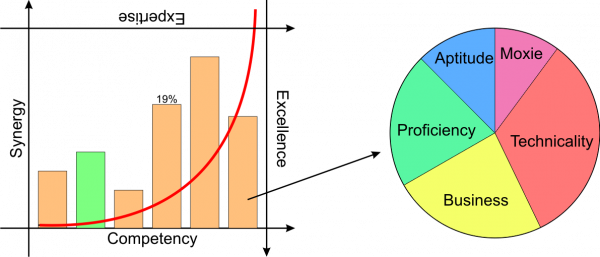Core Competencies
The Core Competencies and You
There are eight core competencies that the company looks for in potential new hires: Auditing, Bureaucracy, Leadership, Networking, Procrastination, Productivity, Sabotage, and Science.
In applying for a position at the company, you should distribute twelve points among the various core competencies, unless you are a Highly Effective Person, in which case you will be hired with six points. Any unspent points may be saved up and redeemed at a later date in exchange for Training Courses. Rumors abound of a select few individuals who were hired with no core competencies due to being Doubly Effective People. These are generally regarded with derision as they often incapable of accomplishing simple tasks and are ultimately unable to live up to their full potential.
Core Competencies are vital to achieving Success! for a variety of reasons. Those who are highly skilled in the Core Competencies can make projects go faster and achieve better results. Those who are highly proficient in a Core Competency are also better a generating Synergy, producing more of it than less competent employees. This means that Highly Effective people will need to cooperate with those who are very skilled in the Core Competencies if they wish to produce the best results (see Figure 1-1).
Unlike the Habits of Highly Effective People, skills allow a company employee to have an ongoing impact on the world. Though they may be less impressive, they are more reliable and effective.

Fig. 1-1: The Company-approved infographic explaining the relationship between Core Competency leveraging and Synergy Production in an easy to understand format
The Core Competency Grades
| Level | Level Point Cost | Total Point Cost | HR Competency Scale |
|---|---|---|---|
| 0 | 0 | 0 | Inept |
| 1 | 1 | 1 | Below Average |
| 2 | 2 | 3 | Average |
| 3 | 3 | 6 | Above Average |
| 4 | 4 | 10 | Excellent |
| 5 | 5 | 15 | Superlative |
Please Note: Being ranked as Average will permit you to successfully leverage your Core Competency in the vast majority of normal situations. As Graduates of the Company Fast Track to Success Program, you have the potential to rank much higher than the average company employee.
The Competencies
Auditing
Auditing is the ability to find discrepancies in paperwork, locate clues buried in filing cabinets, uncover wrongdoing. It can be used to detect fraud in even the most complex accounts and can spot saboteurs through careful analysis of personnel files. The company needs skilled auditors to ensure its employees are complying with all rules and regulations and detect any occurrences of corporate espionage.
Bureaucracy
Bureaucracy is the ability to hide your tracks from fellow employees, other companies and management in the mountains of paperwork that get produced on a daily basis. Skilled bureaucrats can “lose” paper trails, embezzle company property, and produce forms and permits for their activities even in rival corporations. The company needs skilled bureaucrats who will only use their skills against the company's rivals.
Leadership
Leadership is the ability to lead a group of people to Success! Skilled leaders can make the most of the people working under them, and are essential to successfully achieve project goals where large workforces are involved. The company requires leaders both in management, and in more mundane roles, such as heading hostile takeover squads.
Networking
Networing is the ability to connect on a one-to-one level with your peers, superiors and underlings. Skilled networkers can call on favours, seal better deals, and have a measure of influence upon those they interact with making climbing the corporate ladder much easier. The company needs skilled networkers to build relationships with clients and politicians and to lie for them at press conferences.
Procrastination
Procrastination is the ability to slow everything down, and even bring work to a halt. Skilled procrastinators greatly hamper projects they are a part of, and negatively contribute to actions they are a part of. Of course, if they want to do this subtly they'll need Bureaucracy to conceal their wastrel ways. The company needs skilled procrastinators to slow down impractical and pointless projects, preventing waste of company resources, or to infiltrate other companies and hamper their work.
Productivity
Productivity is the ability to buckle down and get work done. Skilled productive individuals contribute greatly to the projects they are a part of, making them proceed faster toward their targets. The company needs productive individuals to ensure that projects are brought to completion, maximising profit and turn-around times.
Sabotage
Sabotage is the subtle art of destroying rival mechanical or electrical creations. Skilled saboteurs can undermine competitor companies' manufacturing plants or rival scientists' giant robots with a well placed spanner or lose screw. Sabotage just covers knowing where to stick the spanner to make it all go boom; to get in undetected you'll need Bureaucracy to falsify security clearances and change guard rotas. The company requires saboteurs to gain an edge over their competitors, and to shut down rogue in house projects.
Science
Science covers planning and designing creations. Skilled scientists can create blueprints for anything they set their minds to (all science is essentially the application of a handful of principles); however, large or complex projects may take time to achieve, and building the scientists designs requires resources and productive individuals as well as leaders if large workforces are involved. The company requires scientists in its R&D Division.